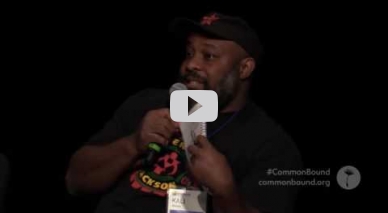
Just over a month ago, more than 900 of us gathered in Buffalo, New York for the second CommonBound conference. We represented many of NEC's 150+ member groups, and hundreds of other organizations globally. Participants came from 42 states, 5 provinces, and 22 countries including Malaysia, Nigeria, Cuba, El Salvador and Spain. They were students, teachers, farmworkers, community bankers, organizers, union members, and more — all hungry for the visionary solutions and strategies our communities desperately need.
While CommonBound was intended to uplift these powerful visions of the future, many of us arrived in Buffalo with the police killings of Alton Sterling and Philando Castile heavy in our hearts. We worked to create space to acknowledge the day-to-day violence and oppression impacting our communities by arranging shuttles to a #BlackLivesMatter rally downtown and opening Friday night with a plenary on sovereignty and liberation. We know that in order to win, we must dismantle the systems of oppression that stand in our way. To win, black lives must matter. Read NEC’s statement from the weekend.
(Speaking of liberation, we urge you to take a moment to read and reflect on the Movement for Black Lives' visionary policy platform: A Vision for Black Lives: Policy Demands for Black Power, Freedom & Justice)
We also designed CommonBound to be rooted in place, partnering with the Crossroads Collective to showcase the history of Buffalo and the current organizing happening around the city. Buffalonians working across issues — from affordable housing, to refugee rights, to community-owned renewable power — have been at the forefront of some of the most powerful organizing happening in the US.
CommonBound participants saw some of this amazing work first hand on Saturday with tours of PUSH Buffalo’s green development zone, a local coal plant in the decommissioning process, and the fruits of a successful community benefits agreement. As NEC’s Executive Director, Jonathan Rosenthal said, “In Buffalo, we saw the best that the New Economy movement has to offer— pushing back against the worst parts of a broken system and building up powerful, inspiring alternatives to replace it.”
These bottom-up, community-based projects are the type of work the new economy is made of and we hoped to reflect those values in the conference structure. Inspired by the decentralized model of the Allied Media Conference, CommonBound was a collaborative effort shaped by more than 80 volunteer coordinators who curated workshop tracks and network gatherings so that the conference reflected many of the organizations and communities leading our movements. Thank you to them — and to the workshop presenters, funders, volunteers, and random acts of generosity that made a conference like this possible! You can learn more about the structure of CommonBound and all the people who made it happen in the conference schedule and program.
At the core of each session were the concrete solutions and strategies taking place around the world: from the Boston Ujima project where grassroots organizations, small businesses, and investors are working together to create a local alternative to the capitalist economic model, to the Italian region Emilia Romagna where co-ops are mainstream. These place-based, community-led solutions offered lessons on the real impact of this work, and pushed attendees to think about what’s possible in their own communities.
But CommonBound wasn’t all panels and workshops: through Open Space conversations, individual conversations and network gatherings, the weekend was a time to connect and learn from others working in the new economy space. As CommonBound 2016 participant Andrew Crosson of Rural Support Partners said: "Never before have I had the sense that our regional work in Appalachia is part of a movement that is this big. We really are more than the sum of our individual efforts, and CommonBound helped to show how we all fit into the "whole" that it is the new economy."
At “Reparations: How Are We Doing It,” workshop participants contributed ideas on how we might realistically institute reparations.
Kadijah Hussein of the Massachusetts Avenue Project speaks at Saturday’s plenary about the work MAP is doing in Buffalo.
Even though CommonBound is over, you can catch up on sessions and plenaries with the archived livestream and experience the conference in tweets, posts, and photos on the CommonBound blog and Flickr albums.
For those who were able to attend or tune in live, we hope you walked away from CommonBound inspired, with a few concrete ideas and relationships that will help move work forward in your communities back home. In the words of Luz Velez, a member-leader with PUSH Buffalo: “A new economy is perhaps the most important inheritance we can leave for our families and the future."
